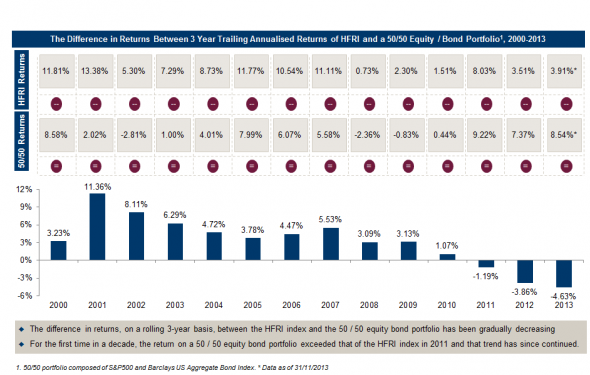John Authers has some other ideas.
From the Financial Time's Long Short blog:
Hedge funds
How exactly should we benchmark hedge funds? It is obviously unfair to compare them directly to equity indices, as the whole point of hedge funds is to aim for an “absolute” return, not a return relative to gains in the equity market. They will naturally under-perform an S&P 500 tracker in years like 2013 when the stock market shoots straight up.
I drew attention last week to the way hedge fund returns have been left badly behind by long-only equity returns over the five years of the post-crisis relief rally, and this understandably provoked comments that this was an unfair comparison. There are also obviously many methodological problems with creating hedge fund indices. Hedge funds have many different strategies, and they may be particularly prone to “survivorship bias” – those that do not have a good story to tell tend to shut down quietly, and do not tell index compilers about their record.
However, hedge funds do have to accept that their offerings will be used by asset allocators trying to use them to balance against the main asset classes of equities and bonds. On that basis, the following chart, produced by Barclays’ capital solutions group using HFRI indices, is very interesting.
It confirms a basic intuition: hedge funds did very well during the bursting of the dotcom bubble, more than held their own during the subsequent 2002-2007 rally, and have had a far harder time of it in the last five years. Why might this be?...MUCH MORE
I count about four broad explanations, which were also canvassed by Barclays when they talked to investors in hedge funds. These are:
1) The hedge fund sector is much bigger now. This is undeniable. Whether because there are now many “me-too” stragglers who have diluted the skill in hedge funds’ gene pool, or because some strategies have reached their capacity – certainly something that seemed to befall equity market-neutral strategies in the summer of 2007 – the new bigger hedge fund sector, as a whole, is less nimble and less able to find bargains....
See also this morning's "Asset International's Periodic Table of Hedge Fund Strategy Returns".
